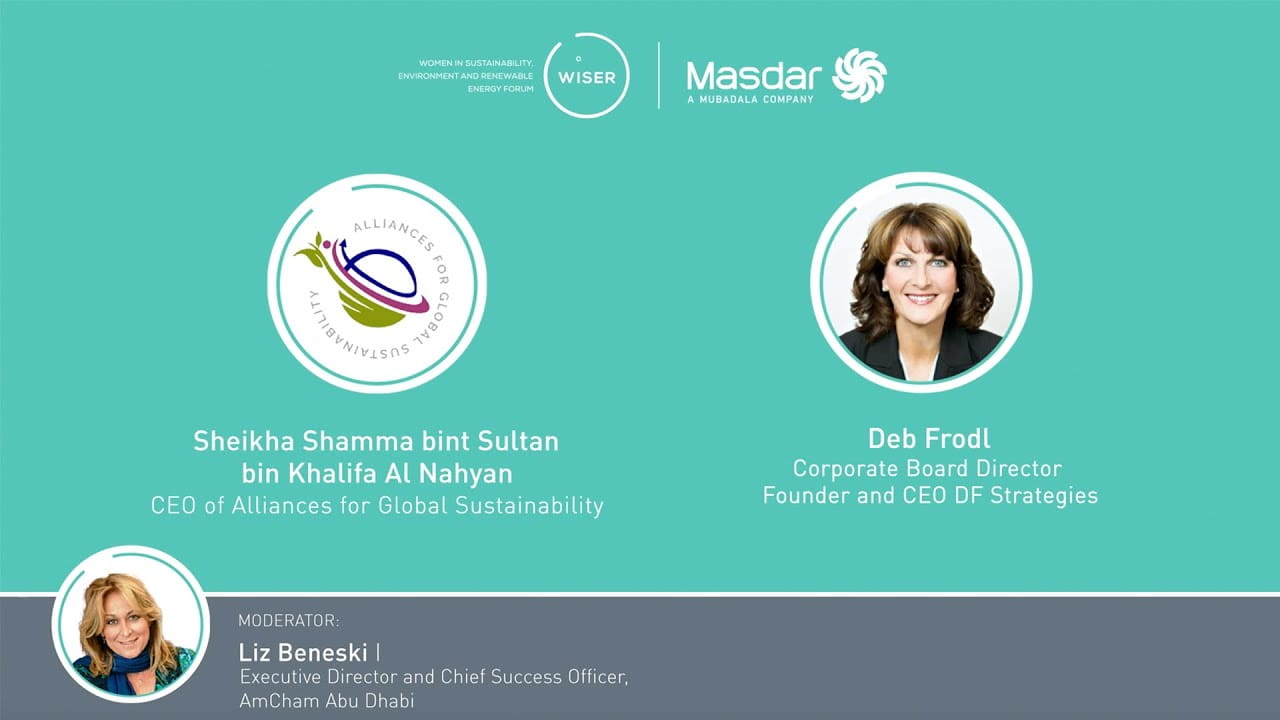WiSER Wisdom Series discusses the importance of women on corporate boards
The importance of women‘s participation in corporate boards was the key topic of discussion during the latest WiSER Wisdom Series, where Sheikha Shamma bint Sultan bin Khalifa Al Nahyan, CEO of Alliances for Global Sustainability and Deb Frodl, Founder and Chief Executive Officer DF Strategies and WiSER Advisory Council member, provided their insights.
Organized by the Women in Sustainability, Environment and Renewable Energy (WiSER), one of Masdar’s strategic outreach platforms, the newly launched webinar-based knowledge-sharing series features speakers from around the world.
The session, which was moderated by Liz Beneski, Executive Director of AmCham – the American Chamber of Commerce in Abu Dhabi – provided an informative overview of how women can prepare themselves to assume board positions during their careers and the support that is available to women in the region.
Highlighting the leading role that the United Arab Emirates is playing in accelerating gender diversity, Sheikha Shamma said: “The UAE has been incredibly progressive in this respect despite being a relatively young nation. I believe that this has been predominantly driven by our leadership who have ensured that the fundamentals of gender parity are embedded in the DNA of the UAE.”
Sheikha Shamma discussed how the UAE’s Gender Balance Council is working toward gender parity across all sectors and how the country recently reinforced its efforts with a national decree mandating equal pay for men and women in the private sector.
Highlighting the need to focus on board diversity, a report by the OECD states that women at the 142 largest publicly listed companies hold on average only 4.8 per cent of the total voting board seats, while only 31 per cent of boards have at least one female member.
Sharing her insights with the guests on how they can attain corporate board positions, Frodl stated: “If you are early or mid-career, take advantage of the programs that are available regionally. It is about building the foundations in your career journey, seeking out the breadth and depth of experience, building your expertise and serving on industry or non-profit boards. These are all precursors to serving on corporate boards in the future.”
Contributing to the conversation on how women can prepare for corporate board memberships, Sheikha Shamma spoke about her Aurora50 project, the 20 for 2020 initiative, which aims to “create a pathway for women to acquire merit-based board positions through opportunities for networking, mentorship and hands-on experience.”
“Women in sustainability bring a lot of expertise to the board discussion. According to Russell Reynolds Associates, Executive Search Firm survey, the top requirements are industry experience, finance, and active or past executive experience. It’s all about building blocks to the boardroom, taking advantage of programs in the region and nurturing your network,” Frodl added.
Companies that have a diverse board membership are likely to perform better financially and this stimulates innovation. With Environmental, Social and Governance (ESG) becoming a trending key topic across all sectors globally, more companies are mandating an increase in female representation in the boardroom.
“There is so much external pressure on public companies today from the institutional investors, the activists, potential employees and customers to increasing that representation, not only in the boardroom, but across the executive level. ESG has been a catalyst for change,” Frodl concluded.




